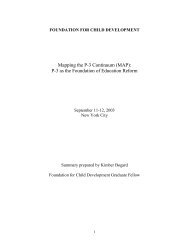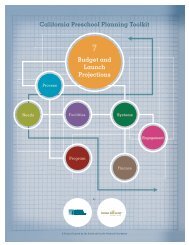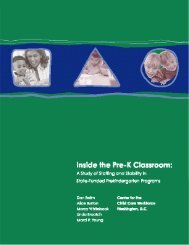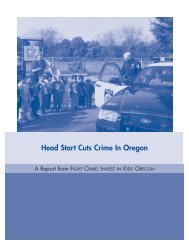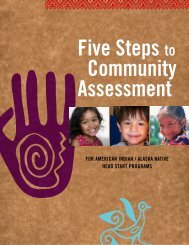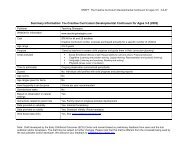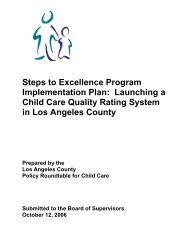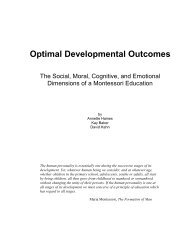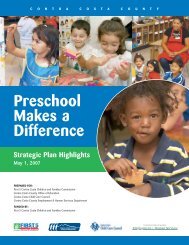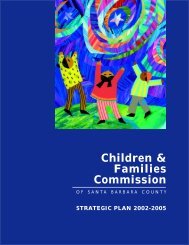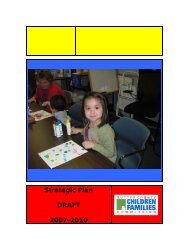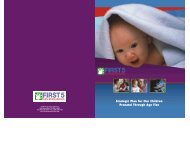Download this file - Plan4Preschool
Download this file - Plan4Preschool
Download this file - Plan4Preschool
You also want an ePaper? Increase the reach of your titles
YUMPU automatically turns print PDFs into web optimized ePapers that Google loves.
Adult Education <br />
Adult education provides educational opportunities and services to equip adults with the<br />
knowledge and skills necessary to participate effectively as citizens, workers, parents,<br />
and family and community members. Instructional programs ensure that adults have the<br />
education and skills required for a competitive economy and a better quality of life.<br />
Adult students are served by school districts, community colleges, community or<br />
faith-based organizations, volunteer literacy organizations, public or private nonprofit<br />
agencies, public libraries, correctional facilities, and state agencies.<br />
The California Department of Education serves over one million adult learners annually<br />
by allocating state and federal funds through its adult education provider network. For<br />
more information, contact the Adult Education Office at (916) 322-2175. Additional<br />
information is also available on the Adult Education Web site at<br />
http://www.cde.ca.gov/sp/ae.<br />
Populations<br />
Adult education serves an increasingly diverse student population, including the<br />
following specialized groups:<br />
Adult Immigrants—Adults who need language instruction and learning experiences<br />
that will permit them to communicate with English speakers; learn the cultures and<br />
customs of the United States; and prepare them for employment, citizenship,<br />
parenthood, and self-sufficiency.<br />
Adults with Disabilities—Individuals with cognitive, physical, sensory, or medical<br />
disabilities or mental disorders. Adult education provides modified equipment, materials,<br />
and instructional strategies to teach literacy, workplace, and family literacy skills.<br />
Disadvantaged Adults—Low-income and hard-to-serve adults who demonstrate basic<br />
skills deficiency below the eighth-grade level. Adult education provides basic skills<br />
training, preparation for the General Educational Development (GED) test, preparation<br />
toward earning a high school diploma, and job skills training opportunities.<br />
Homeless Adults—Persons living in extreme poverty who often cannot afford to travel<br />
to adult education programs. Adult literacy services provide life skills instruction,<br />
linkages to community resources, self-esteem support, and preparation for employment.<br />
Incarcerated Adults—Individuals who are convicted of any criminal offense.<br />
Incarcerated adults represent a significant portion of the hard-to-serve or dropout<br />
segment of the educational system. The correctional education programs provide<br />
educational and job training services in technology, English as a second language, high<br />
school credit, and basic education programs to prepare inmates to become responsible<br />
citizens and to successfully integrate into society.<br />
95



